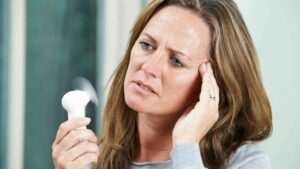Welcome to a transformative phase in a woman’s life—menopause. As natural as this transition is, it often comes with a myriad of symptoms that can significantly impact daily life. Hot flashes, mood swings, sleep disturbances, and more can make this journey challenging. Fortunately, there are various menopause relief medicines and holistic approaches available to help you manage these symptoms. In this blog, we will explore a range of options, from pharmaceutical solutions to natural remedies, providing you with insights to make informed decisions tailored to your unique needs.
Contents
Should I Consider Menopause Relief Medicine?
 Navigating menopause can be a unique and sometimes challenging experience for every woman. The decision to consider menopause relief medicine is a personal one that depends on various factors, including the severity of your symptoms, overall health, and individual preferences. Here are some considerations to help you determine if menopause relief medicine is the right choice for you:
Navigating menopause can be a unique and sometimes challenging experience for every woman. The decision to consider menopause relief medicine is a personal one that depends on various factors, including the severity of your symptoms, overall health, and individual preferences. Here are some considerations to help you determine if menopause relief medicine is the right choice for you:
- Severity of Symptoms: Assess the intensity of your menopausal symptoms. If hot flashes, mood swings, sleep disturbances, and other symptoms are significantly impacting your quality of life, relief medicines may be worth considering.
- Impact on Daily Functioning: Consider how your symptoms affect your daily activities, work, relationships, and overall well-being. If they interfere with your ability to function normally, seeking relief through medicine may be a viable option.
- Medical History and Health Conditions: Evaluate your medical history and any pre-existing health conditions. Some women may have contraindications to certain menopause relief medicines, and a thorough assessment with a healthcare professional is crucial.
- Consultation with Healthcare Professionals: Schedule a consultation with a healthcare professional to discuss your symptoms, medical history, and preferences. They can provide personalized advice, discuss the available treatment options, and help you make an informed decision.
- Quality of Life Goals: Consider your long-term quality of life goals. Menopause relief medicine can provide significant benefits for some women. And, allowing them to maintain an active and fulfilling lifestyle despite the challenges of this transition.
- Monitoring and Adjustments: Understand that the effectiveness of menopause relief medicine may vary from person to person. Regular monitoring and communication with your healthcare provider are essential to make any necessary adjustments to your treatment plan.
Overall, the decision to consider menopause relief medicine is subjective and should be based on a thorough assessment of your symptoms, health status, and personal preferences. Working closely with a healthcare professional will help you tailor a plan that addresses your unique needs and supports you through this transformative phase of life.
What Are Some Menopause Relief Medicines?
There are several menopause relief medicines available, ranging from hormonal therapies to non-hormonal medications. The choice of medication depends on individual symptoms, medical history, and personal preferences. Here are some common types:
Hormone Replacement Therapy (HRT)
Hormone Replacement Therapy is a widely used approach for alleviating menopausal symptoms, particularly hot flashes, night sweats, and vaginal dryness. Estrogen therapy, available in various forms such as pills, patches, creams, and vaginal rings, is a common component of HRT. For women who have undergone a hysterectomy, estrogen-only therapy may be recommended. However, for those with an intact uterus, a combination of estrogen and progestin is often prescribed to mitigate the risk of endometrial cancer associated with estrogen-only treatment.
Selective Estrogen Receptor Modulators (SERMs)
Raloxifene is a SERM primarily prescribed to prevent osteoporosis in postmenopausal women. While its primary focus is on bone health, some women may also experience relief from hot flashes. SERMs act as selective estrogen agonists or antagonists in different tissues, providing a nuanced approach to symptom management.
Gabapentin and Pregabalin
Originally developed as anticonvulsant medications, gabapentin, and pregabalin have shown efficacy in managing menopausal symptoms. These drugs are particularly known for their ability to reduce the frequency and intensity of hot flashes. And in some cases, they may also contribute to better sleep quality.
Clonidine
Clonidine, primarily used to treat high blood pressure, has found application in managing menopausal symptoms. This medication is thought to affect the central nervous system, leading to a reduction in the occurrence of hot flashes. While not as commonly prescribed as some other options, it may be considered for women who cannot or prefer not to use hormonal therapies.
Antidepressants (SSRIs and SNRIs)
Certain antidepressants, such as selective serotonin reuptake inhibitors (SSRIs) and serotonin-norepinephrine reuptake inhibitors (SNRIs), can be effective in alleviating mood swings, irritability, and hot flashes. Medications like venlafaxine and paroxetine may provide relief from both physical and emotional symptoms associated with menopause, making them a versatile option for some women.
Vaginal Estrogen
Vaginal estrogen products, including creams, tablets, or rings, are specifically designed to address symptoms related to vaginal dryness and discomfort. These localized treatments deliver a low dose of estrogen directly to the vaginal tissues, promoting improved elasticity and moisture. Vaginal estrogen is often preferred by women who wish to target specific symptoms without exposing the entire body to higher systemic estrogen levels.
It’s important to note that the decision to use menopause relief medicines should be made in consultation with a healthcare professional. They will consider your health profile, medical history, and the specific nature of your menopausal symptoms before recommending an appropriate treatment plan.
What Is The Best Medicine For Instant Menopause Relief?
 There is no one-size-fits-all answer to the best medicine for instant menopause relief, as individual responses to medications vary. However, for many women experiencing intense and immediate symptoms such as hot flashes, hormonal therapies like estrogen in the form of patches or oral medications may provide relatively fast relief. Estrogen acts to replenish declining hormone levels during menopause, helping to regulate body temperature and alleviate symptoms like hot flashes.
There is no one-size-fits-all answer to the best medicine for instant menopause relief, as individual responses to medications vary. However, for many women experiencing intense and immediate symptoms such as hot flashes, hormonal therapies like estrogen in the form of patches or oral medications may provide relatively fast relief. Estrogen acts to replenish declining hormone levels during menopause, helping to regulate body temperature and alleviate symptoms like hot flashes.
Certain non-hormonal medications like selective serotonin reuptake inhibitors (SSRIs), serotonin-norepinephrine reuptake inhibitors (SNRIs), or gabapentin may offer quicker relief from symptoms like mood swings and hot flashes. These medications work by modulating neurotransmitters in the brain. And, addressing both the emotional and physical aspects of menopausal symptoms. However, it’s important to note that while some women may experience rapid relief, individual responses can vary.
Are Menopause Relief Medicines Safe?
Menopause relief medicines can be safe and effective when used under the guidance of a healthcare professional. Hormone Replacement Therapy (HRT), a common approach to managing menopausal symptoms, has been extensively studied and proven effective for many women. However, its safety depends on various factors, including the specific formulation, dosage, and the individual’s health history. Women with certain medical conditions, such as a history of breast cancer or cardiovascular issues, may need to explore alternative options to HRT.
It’s essential for individuals considering menopause relief medicines to have open and thorough discussions with their healthcare providers, allowing for a personalized assessment of risks and benefits. Non-hormonal medications are generally considered safe for managing menopausal symptoms. However, as with any medication, side effects and individual responses can vary. Regular monitoring and follow-up with healthcare professionals are crucial.
What Are Some Remedies To Help In Menopause?
 Managing menopausal symptoms often involves a combination of lifestyle changes, natural remedies, and, in some cases, medications. Here are some remedies that may help alleviate menopausal symptoms:
Managing menopausal symptoms often involves a combination of lifestyle changes, natural remedies, and, in some cases, medications. Here are some remedies that may help alleviate menopausal symptoms:
Healthy Diet
Adopting a well-balanced and nutritious diet can positively impact menopausal symptoms. Include a variety of fruits, vegetables, whole grains, and lean proteins in your meals. Foods rich in calcium and vitamin D contribute to bone health, which is particularly important during menopause.
Regular Exercise
Engaging in regular physical activity can help manage weight, improve mood, and promote overall well-being. Weight-bearing exercises, such as walking, jogging, or strength training, can also support bone health.
Stay Hydrated
Adequate hydration is essential for managing various symptoms, including hot flashes. Opt for water, herbal teas, and other non-caffeinated beverages to stay hydrated throughout the day.
Herbal Supplements
Some women find relief from menopausal symptoms through herbal supplements. Black cohosh, red clover, and dong quai are among the herbs commonly used to alleviate hot flashes and mood swings. However, it’s crucial to consult with a healthcare professional before using herbal remedies, as they may interact with medications or have contraindications.
Mind-Body Techniques
Practices such as yoga, meditation, and deep-breathing exercises can help manage stress and improve sleep quality. Mindfulness-based stress reduction techniques may also contribute to emotional well-being during the menopausal transition.
Acupuncture
Some women report relief from menopausal symptoms with acupuncture. This traditional Chinese medicine practice involves inserting thin needles into specific points on the body, and it is believed to help balance energy flow and alleviate various symptoms.
Regular Health Check-ups
Schedule regular check-ups with your healthcare provider to monitor your overall health and discuss any menopausal symptoms you may be experiencing. This allows for timely adjustments to your management plan if needed.
It’s important to note that the effectiveness of these remedies can vary among individuals, and what works for one person may not work for another. Consulting with a healthcare professional can help create a personalized approach to managing menopausal symptoms based on your specific needs and health history.
Conclusion
In conclusion, navigating menopause is a unique journey for every woman, and finding menopause relief medicines involves a combination of approaches tailored to individual needs. Whether considering pharmaceutical options like Hormone Replacement Therapy or exploring natural remedies and lifestyle changes, the key is to prioritize open communication with healthcare professionals. A healthy diet, regular exercise, and mindfulness techniques can complement medication use, contributing to overall well-being during this transformative phase.
Remember, seeking support from loved ones and staying proactive about health check-ups are integral parts of embracing menopause with confidence and reclaiming control over one’s life. If you are facing menopause-related issues, menopause treatment at HerMantra can help. Book your free trial online menopause treatment session now.


